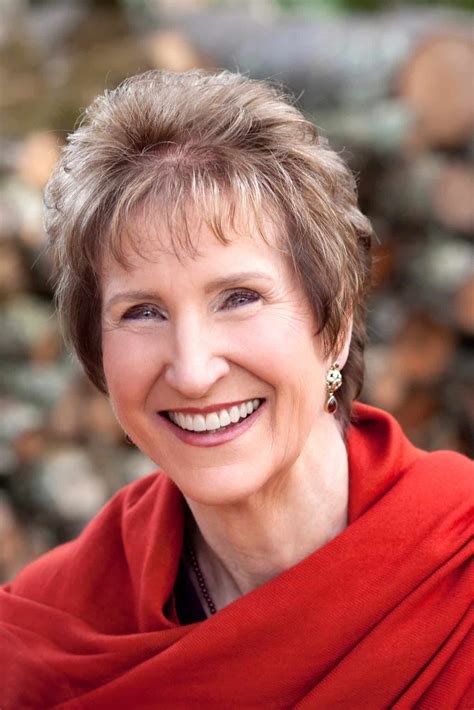A Quote by John Calvin
Let us be peaceable as near as we can: let us relent of our own right: let us not strive for these worldly goods, honour and reputation: let us bear all wrongs and outrages, rather than be moved to any debate through our own fault. But in the meanwhile, let us fight for God's truth with tooth and nail.
Related Quotes
A blessed thing it is to have a friend; one human soul whom we can trust utterly; who knows the best and worst of us, and who loves us in spite of all our faults; who will speak the honest truth to us, while the world flatters us to our face, and laughs at us behind our back; who will give us counsel and reproof in a day of prosperity and self-conceit; but who, again, will comfort and encourage us in days of difficulty and sorrow, when the world leaves us alone to fight our own battle as we can.
God is not concerned about our plans; He doesn’t ask, “Do you want to go through this loss of a loved one, this difficulty, or this defeat?” No, He allows these things for His own purpose. The things we are going through are either making us sweeter, better, and nobler men and women, or they are making us more critical and fault-finding, and more insistent on our own way. The things that happen either make us evil, or they make us more saintly, depending entirely on our relationship with God and its level of intimacy.
Instead of working for white man and helping him hold up a government that continues to suppress us socially and, and exploit us economically and oppress us politically, let us go and enter our own territory and use our own talents to uplift ourselves by our own bootstraps. And then he will recognize us for what we are.
There are two gods. The god our teachers teach us about, and the God who teaches us. The god about whom people usually talk, and the God who talks to us. The god we learn to fear, and the God who speaks to us of mercy. The god who is somewhere up on high, and the God who is here in our daily lives. The god who demands punishment, and the God who forgives us our trespasses. The god who threatens us with the torments of Hell, and the God who shows us the true path.
There are two gods. A god who casts us off because of our sins, and a God who calls to us with His love.
Make no mistake: Satan’s specialty is psychological warfare. If he can turn us on God (“It’s not fair!”), or turn us on others (“It’s their fault!”), or turn us on ourselves (“I’m so stupid!”), we won’t turn on him. If we keep fighting within ourselves and losing our own inner battles, we’ll never have the strength to stand up and fight our true enemy.
I know that God loves us. He allows us to exercise our moral agency even when we misuse it. He permits us to make our own decisions. Christ cannot help us if we do not trust Him; He cannot teach us if we do not serve Him. He will not force us to do what's right, but He will show us the way only when we decide to serve Him. Certainly, for us to serve in His kingdom, Christ requires that we experience a change of thought and attitude.
Let us pause before the Child of Bethlehem. Let us allow our hearts to be touched, let us allow ourselves to be warmed by the tenderness of God; we need his caress. God is full of love: to him be praise and glory forever! God is peace: let us ask him to help us to be peacemakers each day, in our life, in our families, in our cities and nations, in the whole world. Let us allow ourselves to be moved by God's goodness.
There is no enemy can hurt us but by our own hands. Satan could not hurt us, if our own corruption betrayed us not. Afflictions cannot hurt us without our own impatience. Temptations cannot hurt us, without our own yieldance. Death could not hurt us, without the sting of our own sins. Sins could not hurt us, without our own impenitence.
A sacred pride should grip us of not being satisfied with the mediocre but to strive (for we can do it, if we want to) with the exertion of all our strength to attain the highest. Let us scorn what is of this earth, let us ignore what is of heaven, let us leave absolutely everything worldly behind us in order to hasten to the abode out of this world, in the proximity of the sublime deity. We do not need to think of stepping back. Of being satisfied with second rank, let us strive for dignity and glory. To attain the highest.
Adversity is a severe instructor, set over us by one who knows us better than we do ourselves, as he loves us better too. He that wrestles with us strengthens our nerves and sharpens our skill. Our antagonist is our helper. This conflict with difficulty makes us acquainted with our object, and compels us to consider it in all its relations. It will not suffer us to be superficial.
The significance of our lives and our fragile planet is then determined only by our own wisdom and courage. We are the custodians of life's meaning. We long for a Parent to care for us, to forgive us our errors, to save us from our childish mistakes. But knowledge is preferable to ignorance. Better by far to embrace the hard truth than a reassuring fable. If we crave some cosmic purpose, then let us find ourselves a worthy goal.
Before making peace, war is necessary, and that war must be made with our self. Our worst enemy is our self: our faults, our weaknesses, our limitations. And our mind is such a traitor! What does it? It covers our faults even from our own eyes, and points out to us the reason for all our difficulties: others! So it constantly deludes us, keeping us unaware of the real enemy, and pushes us towards those others to fight them, showing them to us as our enemies.
The storyteller is deep inside everyone of us. The story-maker is always with us. Let us suppose our world is attacked by war, by the horrors that we all of us easily imagine. Let us suppose floods wash through our cities, the seas rise . . . but the storyteller will be there, for it is our imaginations which shape us, keep us, create us - for good and for ill. It is our stories that will recreate us, when we are torn, hurt, even destroyed. It is the storyteller, the dream-maker, the myth-maker, that is our phoenix, that represents us at our best, and at our most creative.




































